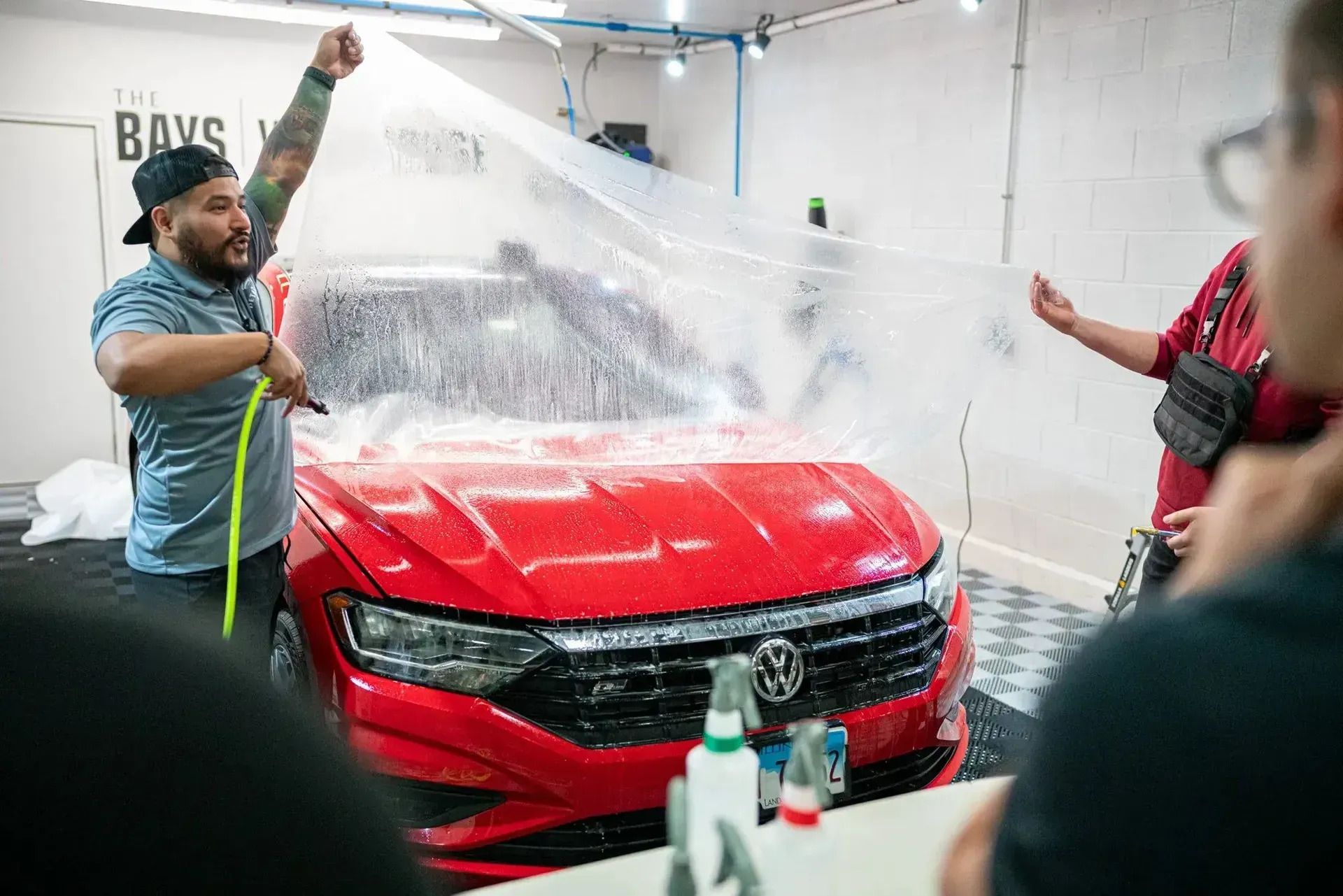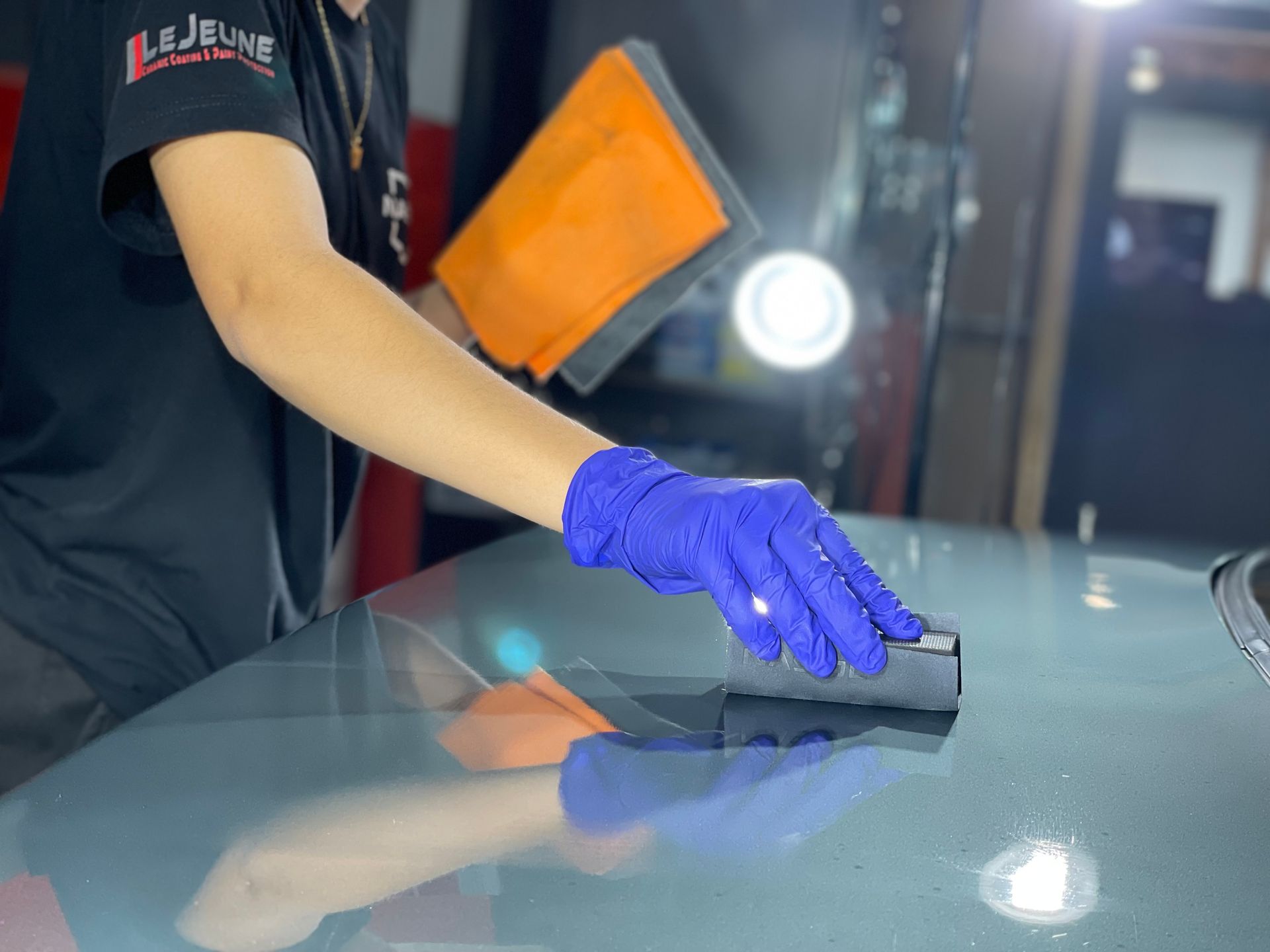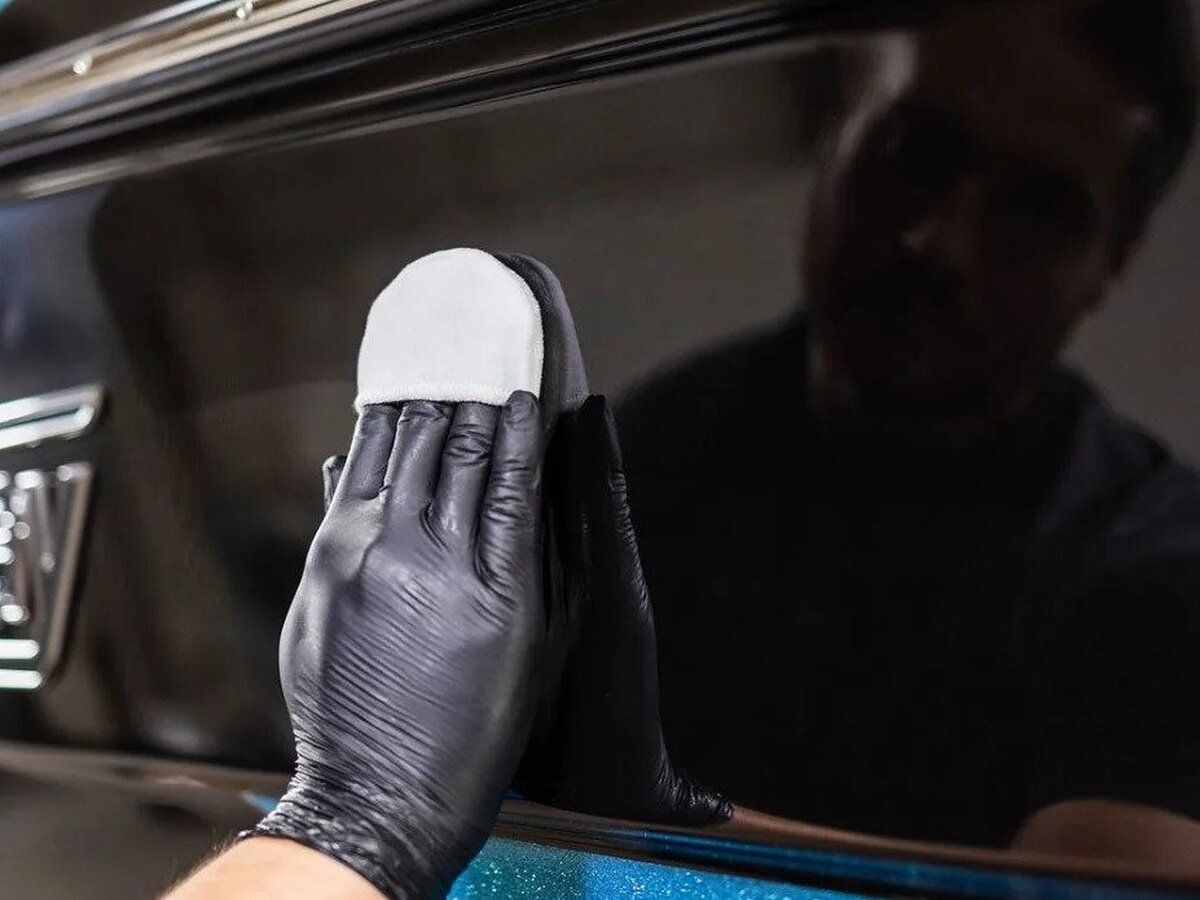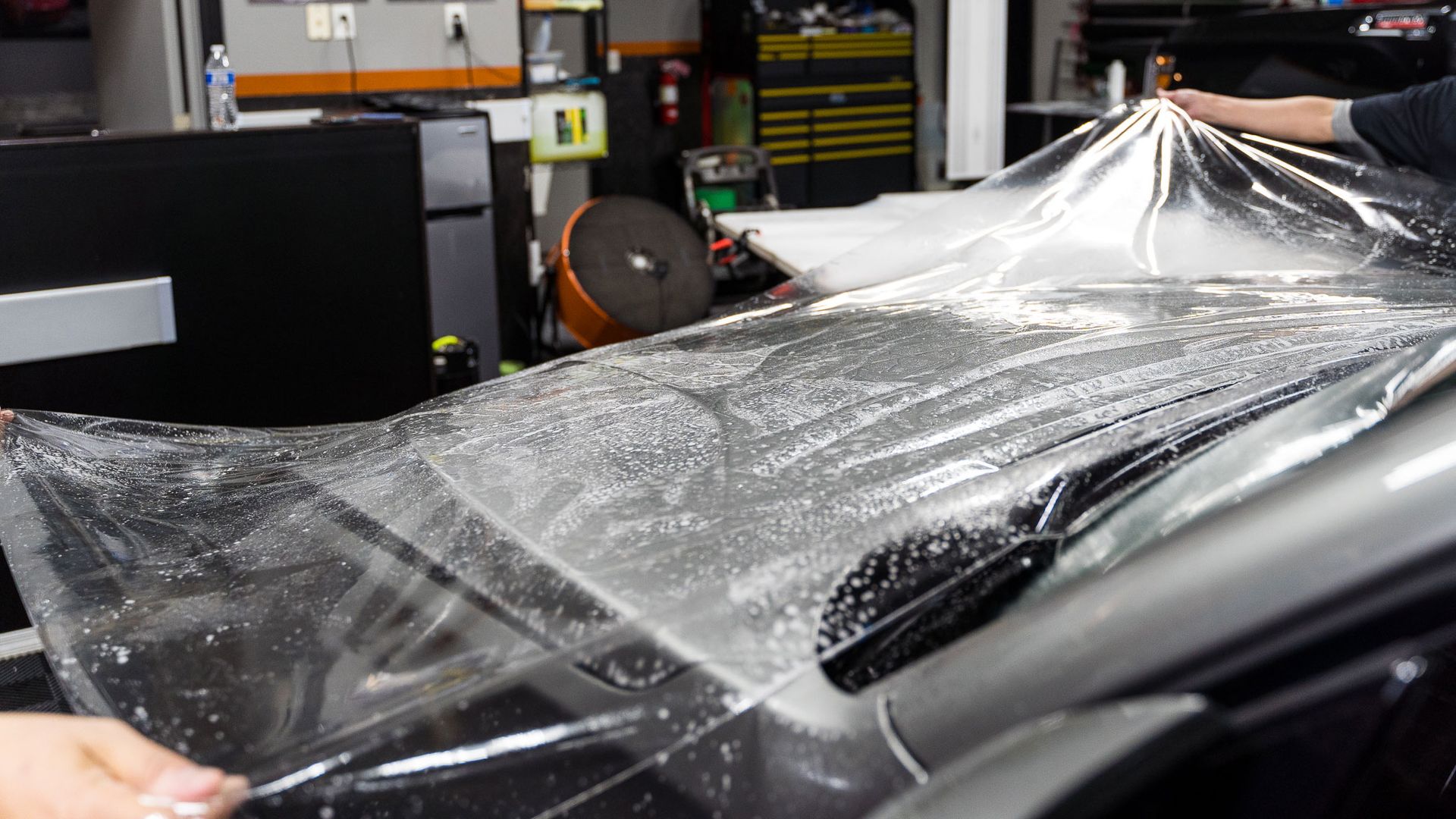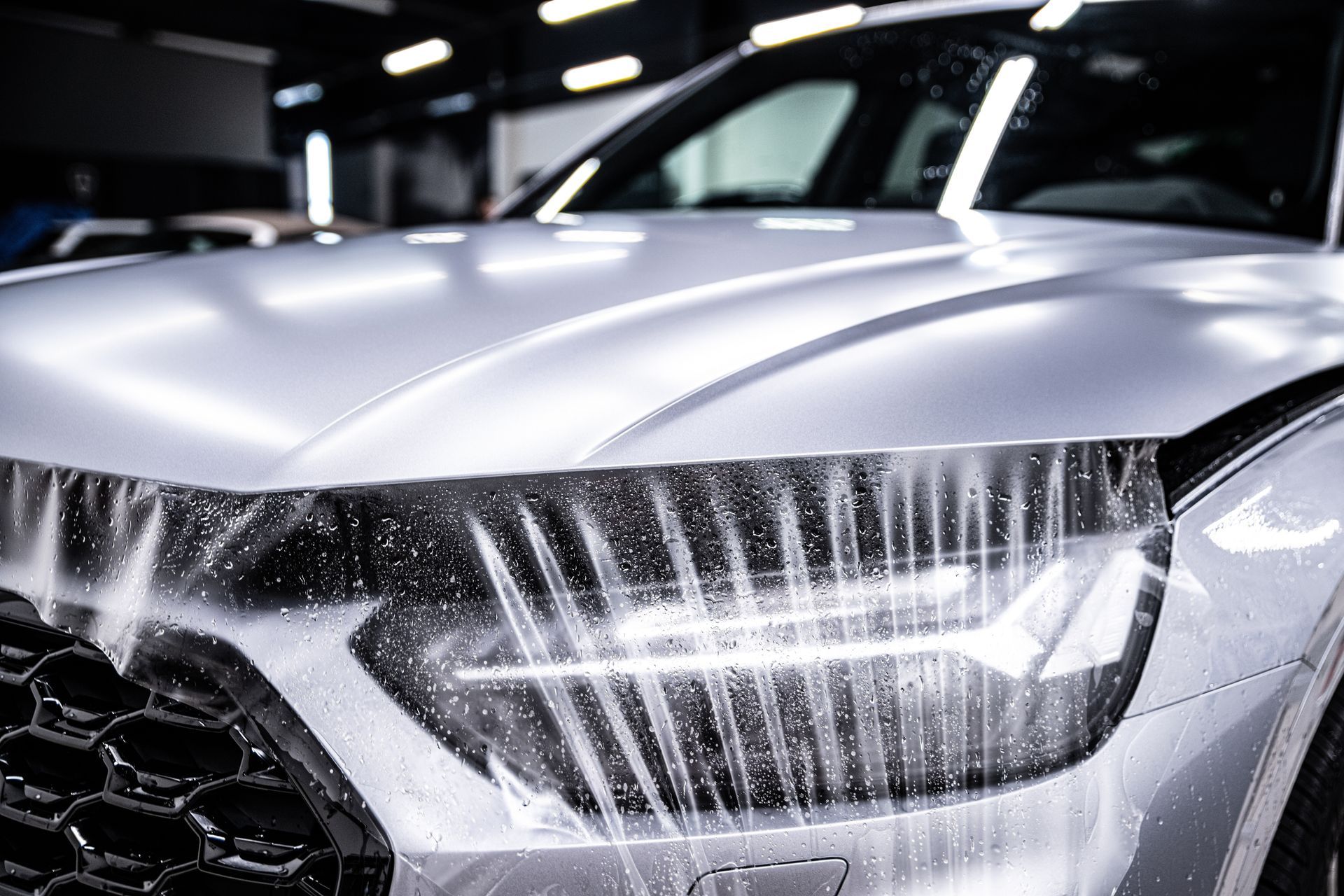Understanding Ceramic Coating: How Does It Work and What Are the Benefits?
GET A QUOTECALL (770) 722-3486
In the world of automotive detailing, ceramic coating has become a buzzword among car enthusiasts and owners alike. The promise of a long-lasting, high-gloss protective layer has piqued the interest of many, but what exactly is a ceramic coating, and how does it work? In this blog, we will delve into the intricacies of ceramic coating, explore its benefits, and understand why it has gained popularity as an exceptional solution for preserving your vehicle's appearance.
Understanding Ceramic Coating
A ceramic coating is a revolutionary protective layer that can be applied to the exterior of your car. A thin, transparent layer of liquid polymer being carefully applied to your vehicle's paintwork. This polymer then creates a chemical bond with the surface, forming a hydrophobic and durable shield that offers exceptional protection. Unlike traditional waxes or sealants that sit on top of the paint, ceramic coatings chemically bond with the surface molecules of your car's paint. This means that once cured, it becomes a part of the painted surface itself rather than a temporary layer. This permanent bond provides several remarkable benefits for your car.
The key component of ceramic coatings is nanotechnology. These coatings contain tiny particles known as nanoparticles that are formulated to fill in microscopic imperfections on the paint surface. This process creates an ultra-smooth finish that enhances the gloss and shine of your car.
By applying a ceramic coating, you're essentially creating an invisible sacrificial layer over your car's paintwork. This layer acts as a protective barrier against environmental contaminants such as dirt, dust, and UV rays. It helps prevent these harmful substances from etching into the clear coat or causing damage to the underlying paint. In addition to protection against environmental elements, ceramic coatings provide exceptional durability. They are resistant to acid rain, road salt, and other corrosive substances that can cause rust and degradation over time. Moreover, their strong chemical bonds make them resistant to chemical etching from acidic substances, such as bird droppings or bug splatters.
Furthermore, a ceramic coating can help reduce the appearance of minor scratches and swirl marks on your car's painted surface. While it won't completely eliminate deep scratches or dents, the coating's self-healing properties enable it to regain its smooth finish and hide light imperfections when exposed to heat, such as from the sun or a heat gun. This feature ensures that your car maintains a pristine appearance for longer periods of time.
How it Protects Against Rust and Impurities
Rust is one of the most common enemies of any vehicle owner. It can eat away at metal surfaces, leading to structural damage and costly repairs. Fortunately, ceramic coatings offer an effective defense mechanism against rust formation on your car's body.
The hydrophobic properties of ceramic coatings prevent water and moisture from lingering on the surface. When water beads up and rolls off instead of sitting on the paintwork, it minimizes the chances of rust formation. But it's not just rust that ceramic coatings protect against; they are also excellent at repelling other impurities. These coatings produce an ultra-smooth finish that makes it difficult for contaminants like dirt, mud, dust, and grime to adhere to the surface. Instead, they slide off easily during regular washing.
Some may argue that regular washing alone can provide sufficient protection against rust and impurities. While proper car maintenance is undoubtedly essential, ceramic coatings take it a step further by providing an additional layer of defense. The hydrophobic properties that repel water and contaminants not only make cleaning easier but also help maintain the integrity of your car's paintwork over time. With a ceramic-coated car, you can enjoy enhanced protection against rust and the unsightly appearance caused by dirt and grime accumulation. This protection ensures that your vehicle looks newer for longer and helps preserve its resale value.
Key Advantages of Ceramic Coating
Ceramic coating has gained tremendous popularity among car enthusiasts for its range of advantages that go beyond aesthetics. Let's explore some of the key benefits it offers your beloved vehicle.
- Exceptional protection against environmental elements: Exposure to sunlight, UV rays, acid rain, bird droppings, and other contaminants can wreak havoc on your car's paintwork. However, a high-quality ceramic coating forms a protective layer that shields the paint from these harmful substances. This layer acts as a sacrificial barrier, preventing them from causing oxidation or etching the paint surface.
- Enhance the gloss and shine of your car's paintwork: The specially formulated nanotechnology in these coatings creates a hydrophobic effect that repels water and dirt. As a result, your car stays cleaner for longer, reducing the need for frequent washing and maintenance. Plus, when you do need to clean it, dirt and grime come off more effortlessly due to the smoothness of the coated surface.
- Longevity and durability of your car's paint: The strong chemical bond formed between the coating and the paint creates a semi-permanent layer that can last for several years. Unlike traditional wax or sealant products that wear off over time, ceramic coatings have long-lasting effects. This durability ensures that your car's paint remains protected even in harsh weather conditions or frequent exposure to pollutants.
Enhances the longevity and Durability of Car Paint
Your car's paintwork can be vulnerable to a myriad of threats, including UV rays, oxidation, chemical stains, and general wear and tear. This is where ceramic coatings shine, safeguarding your car's exterior in the long run.
By providing a robust protective layer, ceramic coatings create a barrier that helps prevent fading or discoloration caused by prolonged exposure to sunlight. The harmful UV rays can gradually deteriorate your car's paint, leading to a dull and lackluster appearance over time. However, ceramic coatings with their UV-resistant properties act as a shield against these damaging rays, helping maintain the vibrant color and shine of your vehicle.
Furthermore, the hydrophobic nature of ceramic coatings enables them to repel water, dirt, and grime more effectively. Since these contaminants are less likely to adhere to the coated surface, there is a reduced risk of chemical staining or etching. This means that even stubborn substances like bird droppings or tree sap can be easily wiped off without leaving any lasting damage or blemishes on your vehicle's paintwork.
For instance, imagine parking your car under a tree for an extended period. Without a protective ceramic coating, bird droppings can eat into the paint surface, causing unsightly marks that may require professional intervention. However, with a ceramic coat in place, a simple wipe with a cloth would suffice to remove the droppings without leaving any visible traces.
Additionally, ceramic coatings offer greater resistance to minor scratches and abrasions due to their increased durability. While it won't guarantee total immunity from all forms of damage, it significantly minimizes the risk of surface scratches during routine washing or accidental contact. The hard protective layer serves as a sacrificial barrier, ensuring that the underlying paintwork remains unharmed.
Having understood how ceramic coatings enhance the longevity and durability of car paint, it's clear that investing in this protective measure offers excellent value and peace of mind.
Environmental Impact of Ceramic Coating
In today's world, where environmental sustainability is a growing concern, it's important to consider the impact our choices have on the planet. When it comes to automotive products, including protective coatings, understanding their environmental implications is crucial. Fortunately, ceramic coatings offer several eco-friendly advantages. Unlike traditional wax- or sealant-based coatings that require frequent reapplication, ceramic coatings are designed to be long-lasting. Once properly applied and cured, they can provide protection for years without needing frequent touch-ups or reapplications. This longevity means less waste generated from product packaging and fewer chemical emissions released into the environment.
Moreover, ceramic coatings offer dirt- and stain-resistance properties, reducing the need for harsh chemical cleaning agents during regular maintenance. Unlike traditional wax, which requires extensive scrubbing to remove dirt buildup, a simple rinse with water is often sufficient to keep a car coated with ceramics looking clean and glossy. This not only minimizes chemical exposure but also saves water by reducing excessive washing. It's worth mentioning that while ceramic coatings have environmental benefits once applied, the manufacturing process of these coatings may still have some environmental impact. Therefore, it's important to choose products from manufacturers committed to sustainable practices and responsible sourcing.
Reduction in Chemical Exposure
One of the significant benefits of a ceramic coating for your car is the reduction in chemical exposure. Traditional wax coatings require regular reapplication and often contain various chemicals that can be harmful to both your vehicle and the environment. However, ceramic coatings are formulated with advanced nanotechnology, creating a protective layer that eliminates the need for frequent reapplication.
With ceramic coating, you no longer have to worry about exposing yourself or your car to potentially harmful chemicals found in wax or other traditional coatings. These coatings are made up of tiny particles that bond with the paint on a molecular level, resulting in a strong and durable shield for your car.
What makes ceramic coatings particularly advantageous is their ability to repel dirt, grime, and water effectively. This hydrophobic property means that contaminants are less likely to stick to the surface of your vehicle, decreasing the need for harsh chemical cleaners during routine washing. This not only reduces your exposure to cleaning agents but also contributes to a more environmentally friendly car care routine. For instance, imagine taking your newly coated car out for a spin. Despite encountering light drizzle or dusty road conditions, you notice that dirt and water simply slide off the surface effortlessly. The shine and pristine appearance of your vehicle remain intact, saving you time and effort in maintaining its cleanliness while mitigating the use of harsh cleaning products.
Furthermore, ceramic coatings offer excellent resistance against UV rays and oxidation, protecting your car's paint from fading or losing its luster over time. This feature helps reduce the need for additional chemical treatments or paint correction procedures that can further expose you and your vehicle to potentially harmful substances.
Deciding on Ceramic Coating: Is It Right For You?
Determining if ceramic coating is the right choice for your vehicle requires considering various factors. It's essential to evaluate your priorities and expectations before investing in this protection.
- Assess your commitment to maintaining your car's appearance regularly. Ceramic coatings offer long-lasting durability, but they are not completely immune to scratches or swirl marks. While they provide excellent protection against many contaminants, routine maintenance and careful washing techniques are still necessary to ensure optimal results. Additionally, understand that ceramic coatings can be a significant financial investment. While the upfront cost may seem high compared to traditional waxing, it is crucial to consider the long-term benefits and savings associated with its durability and reduced need for frequent reapplication.
- Consider the climate and environmental conditions in which you typically drive your car. If you live in an area with harsh weather conditions, such as extreme heat or heavy snowfall, a ceramic coating can offer additional protection against these elements. The hydrophobic properties of ceramic coatings can help prevent water spots or damage from UV rays.
- Take into account the age and condition of your vehicle. If you have an older car with extensive paint damage or imperfections, it might be worth considering paint correction services before applying a ceramic coating. This will ensure that the surface is properly prepared for the coating and maximize its effectiveness.
When deciding whether ceramic coating is right for you, it's always beneficial to consult with professionals who specialize in automotive detailing. They can guide you through the process, assess your specific needs, and provide insights tailored to your situation.
Experience Unparalleled Ceramic Coating Services with LeJeune Ceramic Coating and Paint Protection!
As the premier auto paint protection installation shop in Marietta, Georgia, we take pride in being experts in Ceramic Coating services. Trust us on your beloved ride and witness the transformative power of our Gtechniq and
Dr. Beasley's Ceramic Coating packages. Our meticulous process includes decontaminating your vehicle's finish and correcting any imperfections before applying our hydrophobic and durable ceramic coatings. Rest assured, your car will be safeguarded against the elements, scratches, and UV damage, preserving its beauty for years to come. Contact us today!

